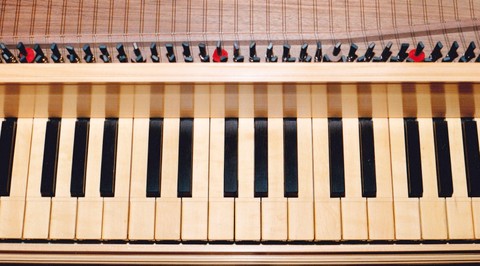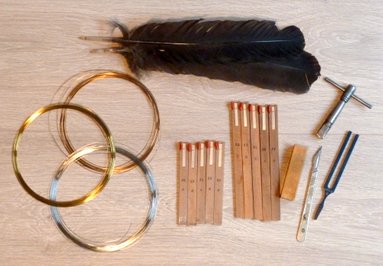Ten good reasons to voice in quill
1 - It sounds better. A well selected, well voiced quill will produce a warmer sound, and more agreeable than the best voiced Delrin.
2 - The touch is more responsive. The rachis of a feather, i.e. the central shaft from which the plectra are cut, has a natural mechanical resilience, which gives it some bounce. This is reflected in the plectrum, giving it a spring and spontaneity not achievable with Delrin.
3 - The touch is lighter. Also because of this natural resilience, the pluck will be much lighter than with Delrin, to obtain the same volume of sound.
4 - Quill plectra will not let you down unexpectedly in the middle of a concert. They do not snap suddenly. They might split lengthwise, weaken etc, but will do so progressively, and thus give you plenty of warning.
5 - Quill plectra are long lasting. If cut and maintained properly, they will last 10, 20 years and much longer. Some plectra in working order have been found on 18th century instruments!
6 - Quill plectra are not difficult to cut and voice. It is just a matter of a bit of practice, a very sharp scalpel (as for Delrin, in fact), and a little more time.
7 - Quill is a historical material. If you have an instrument made with all the historically correct materials, strung with historically correct wire, then, voicing in anything other than quill is complete nonsense.
8 - Few feathers are required. Three good feathers will be ample to voice five octaves, and leave material for spares.
9 - The strength of the pluck is adapted to the pitch of the note. The thin end of the rachis is used in the treble or on the 4’, the median part in the middle, and the thickest part near the calamus for the bass. Thus, the stress applied when plucking will be proportional to the natural strength of the plectrum.
10 - It sounds so much better! To the player as well as to the audience.
OK, that sounds great! So, why even think about using anything else than quill?
Of course, there are a few disadvantages. This is also true. But I wanted to list and describe the qualities of quill plectra: Delrin is so widely used nowadays that the specific and very valuable qualities of quill tend to be forgotten.
Choice of feathers
Good feathers are very difficult to get hold of.
In any one bird, only a few feathers are really good: these are the primary flight feathers of the wings. They are the longest and strongest feathers, and are those connected to the hand of the bird. They have the particularity of having a flattish rachis, the ideal shape to go and pluck a string. Secondary flight feathers are weaker and have a roundish rachis: plectra cut from those will be much shorter-lived, and less loud (perhaps contributing to the bad reputation of quill plectra). To my mind, these should not be used for the purpose of voicing harpsichords.
In addition, feathers need to come from healthy birds. They need to have a good diet, and be in good physical condition. Battery birds, however well fed, will have feathers too weak for the purpose.
And finally, black birds are preferable: melanin is not just a pigment, it contributes to the mechanical resilience.
Free-range black turkeys have excellent primary feathers. On the wild side, ravens or vultures are also excellent, with a bit of luck you might find some of their feathers on the ground (bear in mind that these are protected species).
Environment of the harpsichord
Unfortunately, quill plectra are more sensitive to environmental conditions, in particular relative humidity. Damp conditions will soften the plectra, whereas excessive dryness will tend to harden them. Quill plectra are also more sensitive to dust, and might harden also for this reason. None of this is irremediable, often it is sufficient to wipe the quill with one’s fingers. But it is a little more work. Although of course, the best maintenance is ... playing the instrument regularly!
Conclusion
You’ll know by now, my personal opinion is that quill plectra are preferable whenever possible. However, Delrin is very useful, especially for instruments subjected to varying levels of relative humidity, or that cannot be regularly serviced. Study instruments played by a number of users, such as in music schools, might also benefit from being voiced in Delrin.




